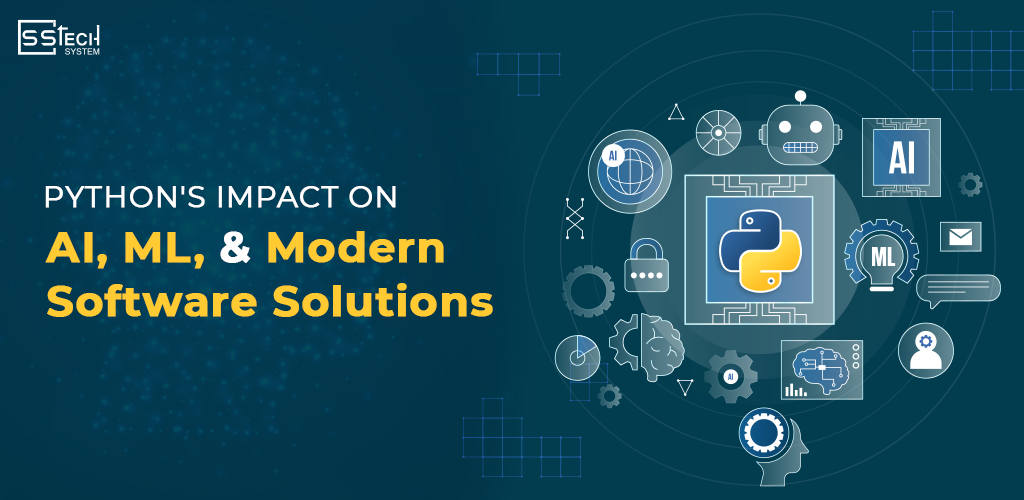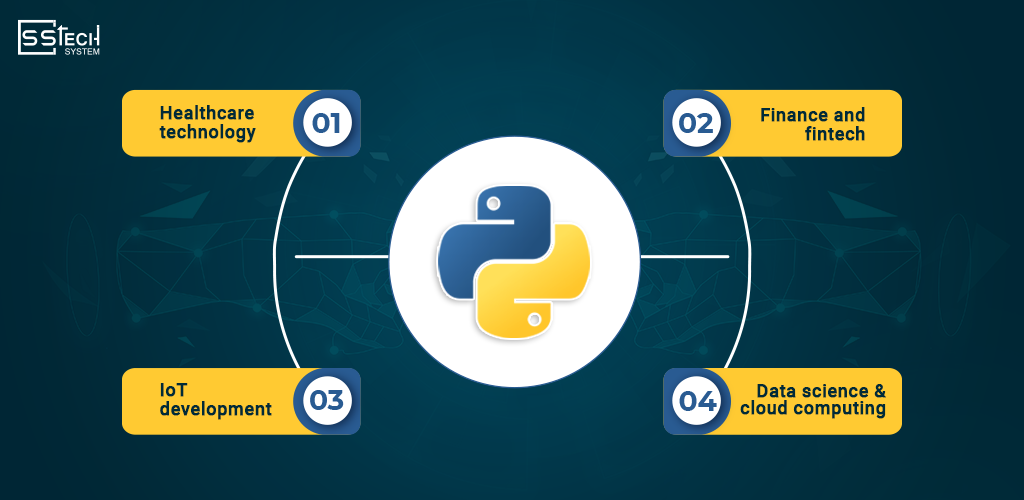
Python has evolved into a necessary language for Modern Software Solutions in the fast-changing digital terrain, especially in AI Development with Python. Renowned for its adaptability, simplicity, and large library support, Python has changed the way modern software development is done.
Its potential for applications in machine learning development, artificial intelligence, data analysis, web development, and even the Internet of Things (IoT) has let developers all around take advantage of Python is becoming the go-to language for artificial intelligence software development and more as it is so widely used in fields including Python for AI development.
This article explores Python’s major influence on AI, ML, and Modern Software Solutions by examining its uses across several sectors and stressing its increasing importance in cloud computing and data analysis.
Python’s Versatility in Modern Software Solutions
According to StackOverflow, the popularity of Python is predicted to grow. The simplicity and readability of Python help to explain its popularity in modern software solutions. The very legible syntax of the language makes writing, understanding, and editing of code simple for developers.
In modern software development, where fast iteration and deployment are usually necessary, this is a key benefit. Thanks in great part to libraries as TensorFlow, Keras, and PyTorch, Python for AI development has grown especially important. These modules help developers effectively create intricate neural networks and machine learning models, thereby accelerating AI development with Python.
Beyond artificial intelligence, Python has shown use in IoT development, banking, and healthcare. Python’s robust data analysis tools libraries—such as Pandas and NumPy—allow it to be utilized extensively in applications driven by data.
Python supports sophisticated data analysis, decision-making, and predictive modeling in areas such financial technology and healthcare, thereby enabling correct forecasting and resource optimization. As a result, Python has become the backbone of software solutions using Python for various real-world applications.
Benefits of Python for Developers and Businesses:
Python development presents various benefits that would attract companies as well as developers. Python’s easy-to-read syntax reduces the time needed to learn and deploy code, allowing them to focus more on AI development in Australia, the United States, and globally.
Particularly in the field of AI software development, Python developers are in great demand because of their simplicity of learning and adaptability. Many companies actively seek to hire Python developers because Python’s functionality meets the demands of the AI and ML markets.
Python for AI development offers companies major cost benefits via lowering development time and mistake-minimizing effects. Its open-source character also helps it to be affordable. Furthermore, Python’s extensive acceptance in data analysis and cloud computing has made it the recommended tool for creating scalable and safe projects.
Python is perfect for both existing companies and startups since it allows quick prototypes and affordable deployment, therefore benefiting both of them. Companies in areas like Sydney, Australia, are using Python modern software solutions more and more to create scalable and strong artificial intelligence applications, therefore helping local businesses to flourish.
Real-world Applications of Python in AI and ML:
Python has very great effects on artificial intelligence and machine learning. Its simple syntax combined with strong libraries and frameworks helps it to be a favored language for creating AI-based solutions.
Python for AI Development has Greatly Changed the Following Real-world uses:

1. Healthcare Technology:
Python has revolutionized the healthcare sector by supporting artificial intelligence software solutions helping in early disease detection, diagnosis, and patient care management. Libraries like Scikit-learn and Keras let developers design complex diagnostic models, which might evaluate patient data and offer real-time insights. Image processing additionally uses Python-based solutions to highly accurately interpret MRI and CT scans, thereby guiding medical experts in their judgments.
2. Finance and Fintech:
Python in financial technology has opened the path for algorithmic trading, risk assessment, and real-time data processing. Using Python’s data analysis tools will enable financial firms to create models that enable credit risk assessment, fraud detection, and portfolio optimization. Python’s strong data processing capacity and effective execution help machine learning firms both in Australia and elsewhere create these applications.
3. IoT Development:
Python for IoT development has grown to be a topic of great interest as the Internet of Things (IoT) has emerged. Python is perfect for creating applications in smart homes, connected autos, and industrial automation thanks to its lightweight frameworks and IoT device interoperability. Python-based IoT solutions enable businesses to create scalable, safe, and effective apps, therefore enabling them to meet the rising demand for linked devices.
4. Data Science and Cloud Computing:
Python’s great library support makes it rather common in data research and cloud computing. Python offers all the tools needed for data cleansing, visualization, and statistical analysis from Pandas and Matplotlib to Seaborn and SciPy.
Furthermore, Python for cloud computing has enabled companies to build scalable cloud solutions with AI capabilities. Cloud-based AI applications are more accessible since Python-based tools and frameworks offered by cloud providers such as AWS, Google Cloud, and Microsoft Azure help to install machine learning models on cloud infrastructure, so simplifying their use.
Python Frameworks for AI, ML, and Web Development
Python’s extensive variety of frameworks accentuates its ability in modern software development. These systems offer pre-built features meant to streamline development. As one example:
- Deep learning and neural network models find extensive use in TensorFlow and Keras.
- Perfect for conventional machine learning models, sklearn provides tools for classification, regression, clustering, and more.
- Flask and Django are popular Python frameworks for web development. While Django’s “batteries-included” approach is perfect for developing scalable web applications, Flask’s minimal weight makes it a favorite for rapid prototypes.
These systems enable developers to choose the finest tools depending on their particular project requirements, therefore making Python development highly effective for artificial intelligence development and a range of applications beyond it.
Python’s Role in Australia’s AI and ML Landscape
Python is a popular choice for AI and machine learning development in Australia, particularly in cities like Sydney. The demand for Python developers specializing in AI, machine learning, and cloud computing has led to its widespread adoption among startups and established companies, including SSTech System Solutions. Python is central to creating AI and machine learning applications across sectors such as retail, healthcare, and finance. With increasing interest in AI and machine learning, Australia is positioning itself as a leader in AI innovation, driving advancements in automation, predictive analytics, and smart apps.
Python’s Applications in Finance, Healthcare, and more
Python programs in finance and healthcare have demonstrated how creatively Python can generate ideas in fields heavily dependent on data. Python finds applications in healthcare for customized medication, predictive analytics, and medical imaging. Faster diagnosis and improved patient outcomes follow from the ability of the language to let healthcare professionals examine patient records and identify illness trends.
Python’s data-handling features are absolutely essential in finance for the prediction-making and analysis of big datasets. Python development is used by financial companies to create strong apps enabling stock performance prediction, market trend assessment, and trading automation. The adaptability of Python has allowed financial firms to satisfy industry high demand and provide real-time answers.
Python is extensively used for developing AI-based chatbots, sentiment analysis tools, and recommendation systems, which significantly enhance customer experiences in domains such as e-commerce, travel, and retail. Moreover, Python’s flexibility makes it a preferred choice across various industries, enabling the creation of a wide range of modern software solutions.
The Future of Python in AI and Modern Software Solutions
The future of Python in modern software solutions and artificial intelligence seems bright. From deep learning to autonomous systems and natural language processing, Python is projected to be the leading AI innovator as artificial intelligence develops.
With uses in many sectors including self-driving cars, intelligent robotics, and advanced healthcare diagnostics, Python is well-positioned to drive developments in artificial intelligence development given its growing library environment and versatility. Python remains the most popular programming language, according to GitHub and Google Trends.
As companies choose cloud-based AI solutions, Python’s importance in cloud computing will likewise grow more clear-cut. This change to the cloud will improve scalability, allowing companies to manage big amounts of data and complicated computations effectively. Together with support from big cloud providers, Python’s frameworks for cloud-based artificial intelligence make it a perfect fit for creating cloud-native apps that make use of AI capability.
Particularly in tech-centric areas like Sydney and Melbourne, Australia, demand for Python developers will keep growing as more businesses embrace AI development with Python. Companies realizing the importance of modern Python software solutions in promoting innovation and operational efficiency should expect the need to hire dedicated developers with Python knowledge to rise.
Conclusion
Modern software solutions, artificial intelligence, and machine learning all have profound and broad effects from Python. The top pick for artificial intelligence and machine learning development is its simplicity, adaptability, and great library support. Python is driving next-gen software solutions across finance, healthcare, IoT, and cloud computing. Its role in modern development has accelerated AI progress, helping businesses create scalable, robust apps more efficiently.
As Python development in Australia and globally continues to grow, industries can expect Python to be at the forefront of technological transformation. Businesses like SSTech System Solutions are already proving Python’s ability to create artificial intelligence software solutions and cloud-based apps. Python is destined to remain a major participant in the future of modern software solutions thanks to its adaptability and increasing support environment.



